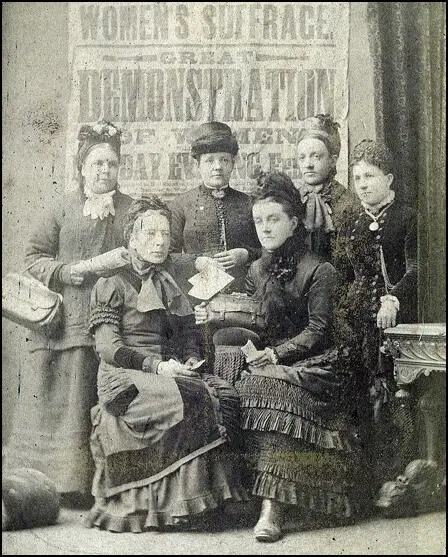Manchester National Society for Women's Suffrage
In October 1865, Elizabeth Wolstenholme-Elmy, established the Manchester Committee for the Enfranchisement of Women. Early members included Ursula Bright, Jacob Bright, Phillippine Kyllman and Richard Pankhurst. Wolstenholme-Elmy later recalled the group was formed with the express purpose of working for the women's suffrage petition to be presented to Henry Fawcett and John Stuart Mill, two MPs who supported universal suffrage. The Manchester group managed to obtain 300 signatures and they joined forces with the Kensington Society, who were organising a petition in London.
Louisa Garrett Anderson later recalled: "John Stuart Mill agreed to present a petition from women householders… On 7th June 1866 the petition with 1,500 signatures was taken to the House of Commons. It was in the name of Barbara Bodichon and others, but some of the active promoters could not come and the honour of presenting it fell to Emily Davies and Elizabeth Garrett…. Elizabeth Garrett liked to be ahead of time, so the delegation arrived early in the Great Hall, Westminster, she with the roll of parchment in her arms. It made a large parcel and she felt conspicuous. To avoid attracting attention she turned to the only woman who seemed, among the hurrying men, to be a permanent resident in that great shrine of memories, the apple-woman, who agreed to hide the precious scroll under her stand; but, learning what it was, insisted first on adding her signature, so the parcel had to be unrolled again." Mill added an amendment to the 1867 Reform Act that would give women the same political rights as men but it was defeated by 196 votes to 73.
In 1867 the Manchester Committee for the Enfranchisement of Women changed its name to the Manchester National Society for Women's Suffrage. Elizabeth Wolstenholme-Elmy now handed over the post of secretary to Lydia Becker. She now began working very closely with the London Society for Women's Suffrage. In August 1867 Becker wrote to Helen Taylor asking for a donation. she pointed out that the London group was so rich in comparison with that in Manchester.

On 30th October 1868, the Manchester National Society for Women's Suffrage established a new executive committee that included Lydia Becker, Elizabeth Wolstenholme-Elmy, Ursula Bright, Jacob Bright and Josephine Butler. Other people who joined over the next few years included Eva Maclaren, Esther Roper and Eva Gore-Booth.
According to Martin Pugh, the author of The Pankhursts (2001), Emmeline Pankhurst attended her first suffrage meeting in 1872, hosted by veteran campaigner, Lydia Becker. "During the late 1860s Manchester also became the scene of one of the earliest campaigns for women's suffrage, and at fourteen Emmeline returned home from school one day to find her mother preparing to attend a suffrage meeting addressed by Lydia Becker in the city. Jane Pankhurst had no hesitation in agreeing to Emmeline, satchel in hand, accompanying her to hear the arguments."
After the death of Lydia Becker in 1890 the Manchester National Society for Women's Suffrage went into decline until Esther Roper was appointed secretary in 1893. In this role she tried to recruit working-class women from the emerging trade union movement. In 1897, along with 500 other suffrage societies, the Manchester group joined the National Union of Women's Suffrage Societies.

